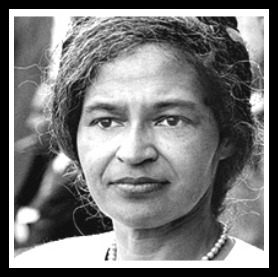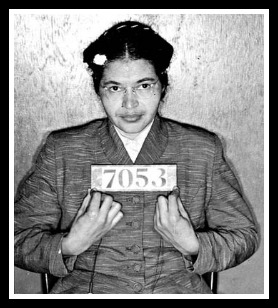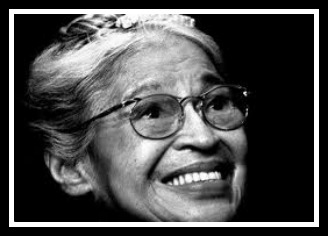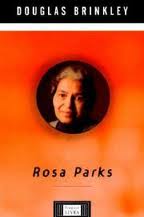This episode was a surprise for us. We had planned on posting a minicast about Rosa Parks to tie in with the episode on Ida B. Wells. The women’s lives had several parallels and we wanted to highlight Rosa Park’s role in the civil rights movement. But, when we sat down to talk, the talk went longer than a typical minicast. So we made it into a full length episode about the woman called, “the mother of the civil rights movement”.
Rosa Louis McCauley was born on Feburary 4, 1913 in Tuskegee, Alabama. As always, we discuss her life in detail on the podcast and merely outline it here, but her family; father James and mother Leona as well as Rosa’s younger brother, Sylvester, left Tuskegee for Pine Level, and then Montgomery, Alabama when Rosa was a child.
She was educated first in a rural school and then at Montgomery Industrial School (also called Miss White’s School), a fairly progressive school for the times run by women from the north. Many people in her early life contributed to her firm belief in equality, and taught her character traits that would serve her well. And we cover them in the podcast, stopping for a few moments extra to talk about the strength of both character and backbone, of her grandfather and her mother, as well as what life was like in the Jim Crow south.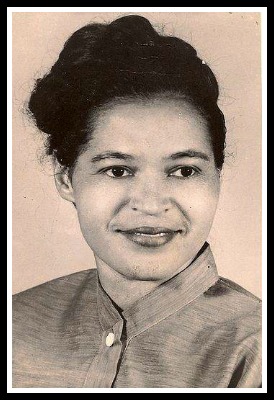
As she was entering college, Rosa had to drop out of school. Her grandmother was ill, and Rosa set off to work as a seamstress to help support her family. It is during this time that she mets a handsome, well dressed, self educated man, Raymond Parks who was a barber by trade, a civil rights activist by desire. They were wed in 1932. With his support, Rosa competed her education.
Raymond and Rosa were very active in their local NAACP chapter, working behind the scenes on cases such as that of the Scottsboro Boys, trying to make right wrongs done to blacks, trying to establish equality for all people. Rosa had served as chapter secretary, as well as working with youth programs and assisting with a very complex voter registration process.
The day that changed her life, was not Rosa’s first encounter with discrimination on a bus. She was far from the first black woman that had been arrested for not giving up her seat so that a white passenger could sit. And, in the podcast, we discuss the many people and actions that play into the success that followed when Rosa was the woman who was arrested.
JoAnn Robinson, a college professor, had gone so far as to intentionally sit in the first row of seats, seats that were always reserved for white passengers. She abandoned her protest when the bus driver kept yelling at her, but she thought that a bus boycott would make a loud impact on not only the economy of Montgomery, but also make strides in race relations.
Claudette Colvin, a teenager, had also been arrested for not giving up her seat months before Rosa.
Rosa Parks herself had also previously been asked to leave a bus for refusing to give up her seat . But on that particular December day in 1955, refuse she did again. She was tired of giving up her seat, tired of being treated in this manner. She was empowered by a series of events in her life and took a stand. By sitting.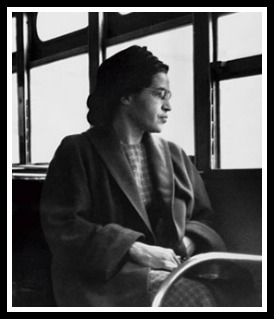
When she was arrested the black community of Montgomery got busy, fast. Jo Ann Robinson, Rev. Martin Luther King, Jr, and many community leaders did in 1955 what it takes the internet to do today: they spread the word. They formed an action plan and got the entire black population informed and organized. Within a day, what was planned as a one- day bus boycott began. It would not end until 381 days later.
By being the right woman at the right time, in the right city and with the right support, Rosa Parks, with her quiet voice and firm but proper demeanor became the mother of the civil rights movement.
Later, Rosa and Raymond moved to Detroit where she worked toward racial and gender equality as a speaker, a writer and activist.
Rosa Parks died at the age of 92, on October 24, 2005 due to complications from dementia. Even in death, she was treated as a national treasure and was allowed to lay in honor at the US Capital Rotunda and two other locations, one in Montgomery and one in Detroit.
Time Travel With The History Chicks
Books! We have a few that we recommend, starting with the one written by Rosa herself, Rosa Parks: My Story.
The award winning children’s book that we thought was really good was,
The Rosa and Raymond Parks Institute for Self Development has a website. Lots of information as well as links to youth programs, although some of the information does seem out of date.
The free, interactive app e-book , The Road to Civil Rights, is available through this site. We didn’t read it, so if you do, send us a review! Academy of Achievement.
Movies! This is the one that we were talking about staring Angela Basset:
Yes, there is an American Experience for that! Eyes on the Prize.
This site has a terrific collection of photos, and videos- worth a click for those alone! Rosaparksfacts.com
There are quite a few activities on this site for kids to learn about Rosa Parks, but here is a link to an interview with her based on student’s questions.
Finally the bus! Recovered and restored with help from the Save America’s Treasures program of the National Trust for Preservation, the bus is on display at the Henry Ford Museum in Dearborn, Michigan. Even if you can’t get to Michigan, you should check out the online resources of this museum.
As always, music comes courtesy of Music Alley. Visit them at Music.mevio.com

